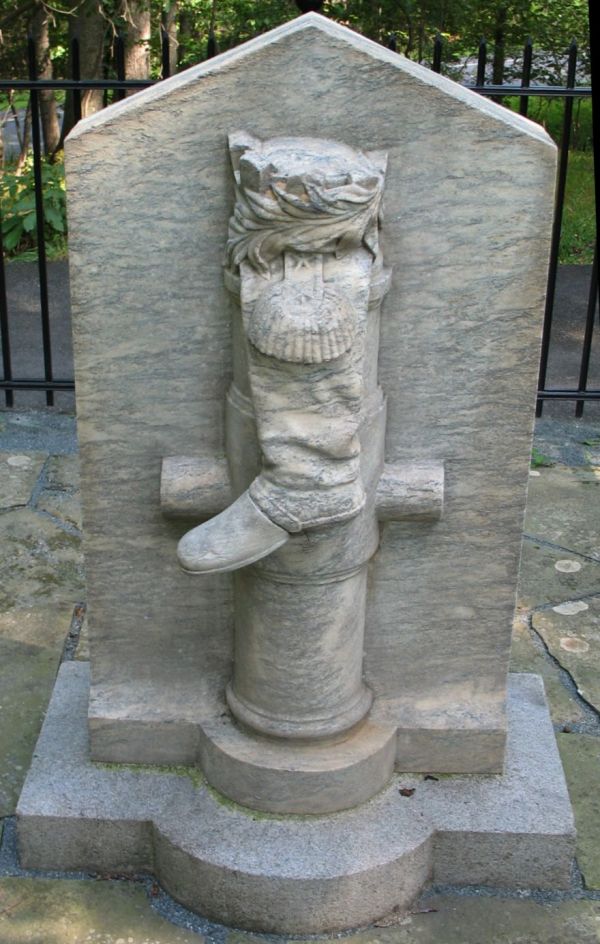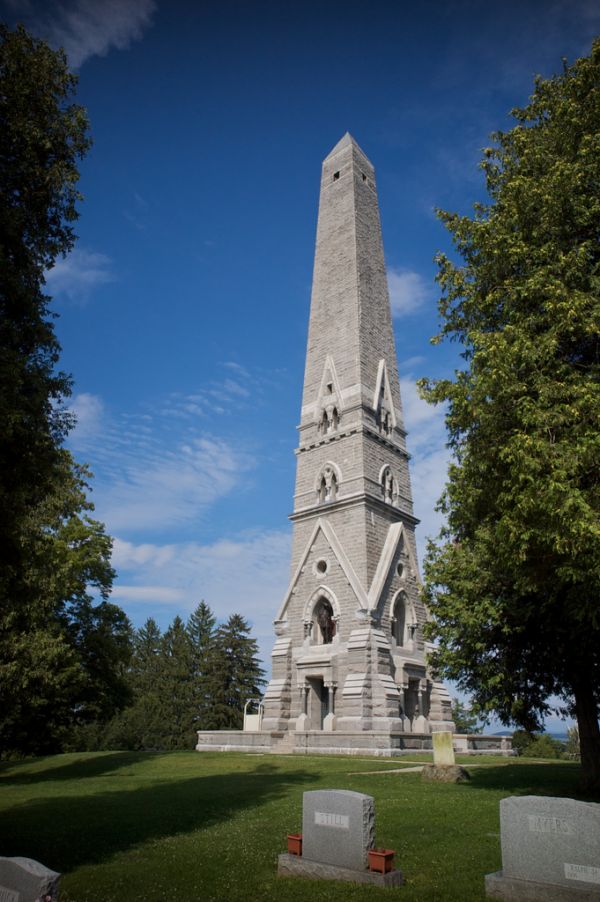Confederate Statues Aren't About Slavery -- They're About Treason
by Jon Levine | 3:15 pm, August 16th, 2017
During that infamous press conference in Trump Tower, yesterday, the president spoke darkly of a slippery slope. Sure you could take down that statue of Robert E. Lee — but where would it end?
“I wonder is it George Washington next week and is it Thomas Jefferson the week after? You know, you really do have to ask yourself where does it stop? asked Trump. “You’re changing history, you’re changing culture.”
Slaveholders all, Trump asserted.
And it’s true. Washington, Jefferson and dozens of other founding fathers were slave holders. In that respect they were no different than the Confederate leaders whose statues sparked protests in Charlottesville and around the country. But Trump is horribly wrong to conclude that our monuments to Washington and others may be in jeopardy if we lose Robert E. Lee. While there will likely always be social justice warriors to protest Washington, or Jefferson or racist sushi, there is a critical distinction that serious people should make that puts Lee and his friends in a very different category.
In a word — Treason.
Lee, Stonewall Jackson, Jefferson Davis, Alexander Stephens and the rest of that seditious brood aren’t monsters in our historical consciousness because they were slaveholders, but rather because the waged a treasonous war against their own people in order to keep slavery going. Their efforts to protect that most “peculiar institution,” was ultimately not conducted at the ballot box but through armed conflict. After peacefully losing the 19th century version of the culture wars with Abraham Lincoln’s election, they chose violence over the graceful acceptance of progress.
more
https://www.mediaite.com/online/confederate-statues-arent-about-slavery-theyre-about-treason/
HopeAgain
(4,407 posts)let's face it. Statutes and monuments aren't about anything but emotional thinking. The Washington and Jefferson monuments illicit feelings of patriotism and American unity.
Rationality has little to do with it. The question is what feelings, thoughts and emotions do these statutes/monuments evoke? Robert E. Lee was a great tactician but he fought for a losing cause. The statutes are there for two reasons: 1) to make southerners feel like their ancestors didn't die in vain, and 2) as symbols of defiance against segregation which they felt was imposed on them by the same people they fought in the Civil war.
The latter, which serves as a reminder to millions of Americans that they were victims of slavery, followed by other forms of cruel oppression, dictate that the Statutes must come down.
ExciteBike66
(2,357 posts)which is the kind treason being discussed.
I wouldn't feel bad if the Brits did not want to have a statue of Washington.
HopeAgain
(4,407 posts)There is no rational basis for even having monuments and statutes. They serve an emotional and spiritual need, sometimes for good sometimes for bad. Simply stated, these Confederate Statutes carry the juju of a horrible American sin a and therefore must be eradicated.
Lithos
(26,403 posts)Up until about 1948, most were erected purely for memory of their ancestors. After 1948, most were erected primarily for the second reason.
That said, those which were originally erected now have become tainted with White Supremacy because of the efforts of those who chose to politicize the dead with their hate and bigotry.
ExciteBike66
(2,357 posts)that the statues are about "slavery", but rather that they are about "white supremacy". It has been pointed out many times already that most of these statues were erected long after formal slavery ceased to exist in this country, but their erection coincided with other forms of brutal repression against black people.
I think a better point to make regarding all of this is that the statues are not only about treason, they are about a treason that was intended to promote slavery, and the later veneration of that treason (i.e. the Lost Cause) was really a promotion of white supremacy.
Lithos
(26,403 posts)The Politicians and money fought for Slavery, most of the others fought for home, money, adventure, or because they were given no other option.
NeoGreen
(4,031 posts)... just ask BA's boot:
http://www.neatorama.com/2014/01/01/Americas-Monument-to-Its-Most-Infamous-Traitor-Benedict-Arnold/
General Arnold’s greatest moment came during the Saratoga campaign, which ended with the surrender of an entire British army. The senior American commander, Horatio Gates, was often indecisive and shy of battle. Arnold, in contrast, was eager for battle. He personally led a successful charge on a British redoubt. During that fight, Arnold was shot in the leg and his horse fell on him.
Had Benedict Arnold died that day, he would likely be known as one of the great heroes of the American Revolutionary War. There would be towns, counties and schools named for him.
But he didn’t die. Arnold lived on to betray his country.
Which brings us to the Saratoga battlefield and the scene of Arnold’s most heroic moment.
Part of the Saratoga battlefield area is a national park. On the grounds are assorted monuments to various leaders and events. These were, of course, all built well after Arnold’s betrayal. How does it address the critical and heroic role of America’s most infamous traitor in that battle?

The monument to Arnold is known as the Boot Monument. That’s because it makes no mention of Arnold by name and honors the leg that was broken during the battle. The inscription reads:
In memory of the most brilliant soldier of the Continental army, who was desperately wounded on this spot, winning for his countrymen the decisive battle of the American Revolution, and for himself the rank of Major General.
John Watts de Peyster, a general in the New York State Militia during the Civil War, erected the monument in 1887. Perhaps de Peyster made it in response to the primary monument, which was erected a few years earlier. The 155-foot tall obelisk has niches for four statues. There are statues for three of the four great American leaders of the battle: General Horatio Gates, General Philip Schuyler and Colonel Daniel Morgan. The fourth niche is empty.

Response to NeoGreen (Reply #5)
Lithos This message was self-deleted by its author.
FakeNoose
(32,639 posts)Thanks for this reminder, and photos.
The "true" heroes will be decided by later generations, so there's no reason for anyone to pose for a statue in their own lifetime.

![]()
Hoyt
(54,770 posts)say something like, "Jefferson talked of liberty and freedom, then went home and raped and beat his slaves."
SCantiGOP
(13,869 posts)in the South that I was born in are about telling the minorities that the same people who were in charge in 1860 are still in charge, and you better not forget it.
There weren't rebel flags displayed in the South until 1960. That was when the SC legislature put the flag on top of the Statehouse (it was later moved to the grounds, and then removed after Roof murdered 9 people in a church in Charleston). Some of the all-white legislature made direct reference to the 100 year anniversary, and the fact that this generation had to stand up against the tyranny of the federal government and their efforts to integrate the public schools the same way the CSA had 100 years earlier.
The war was about slavery. The flags going up 100 years later and now are no longer directly about slavery, but are instead about downplaying slavery while continuing to deny full rights to the descendants of those slaves and protect white privilege.